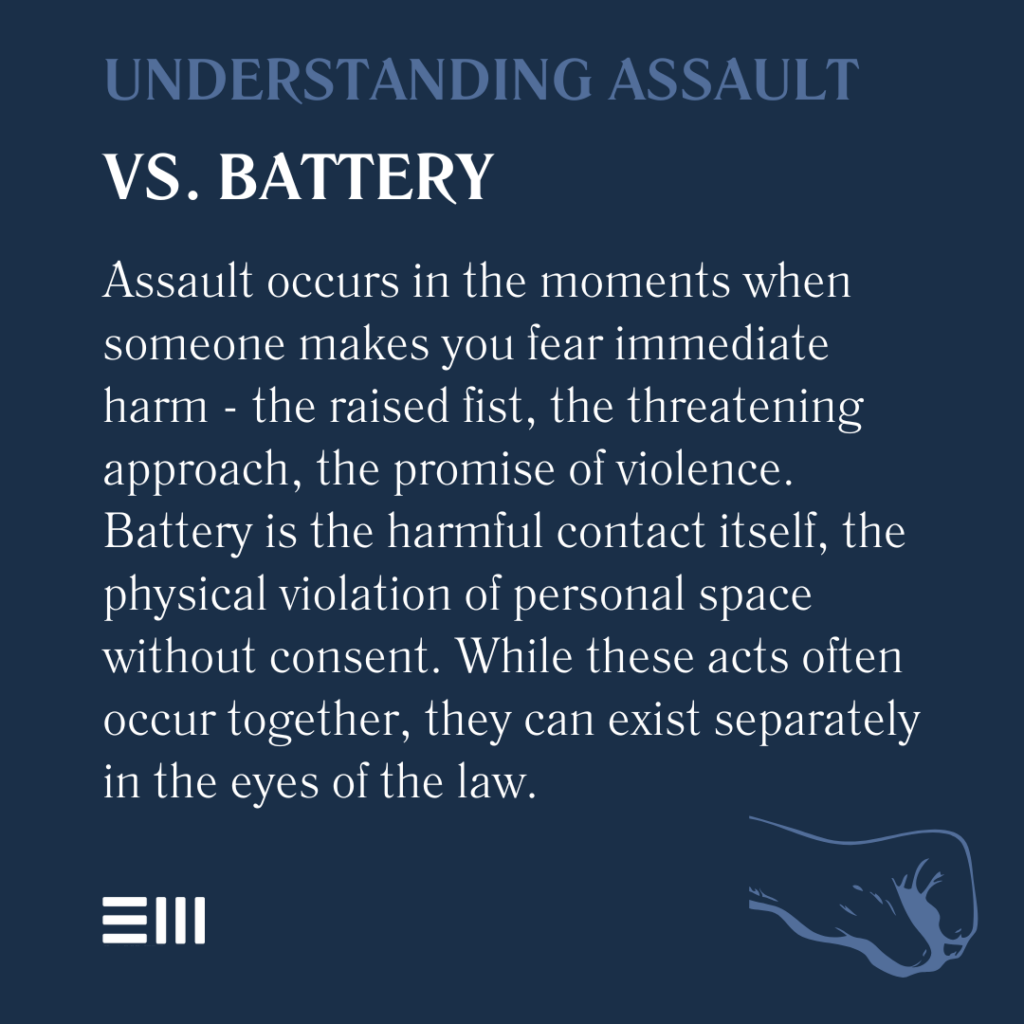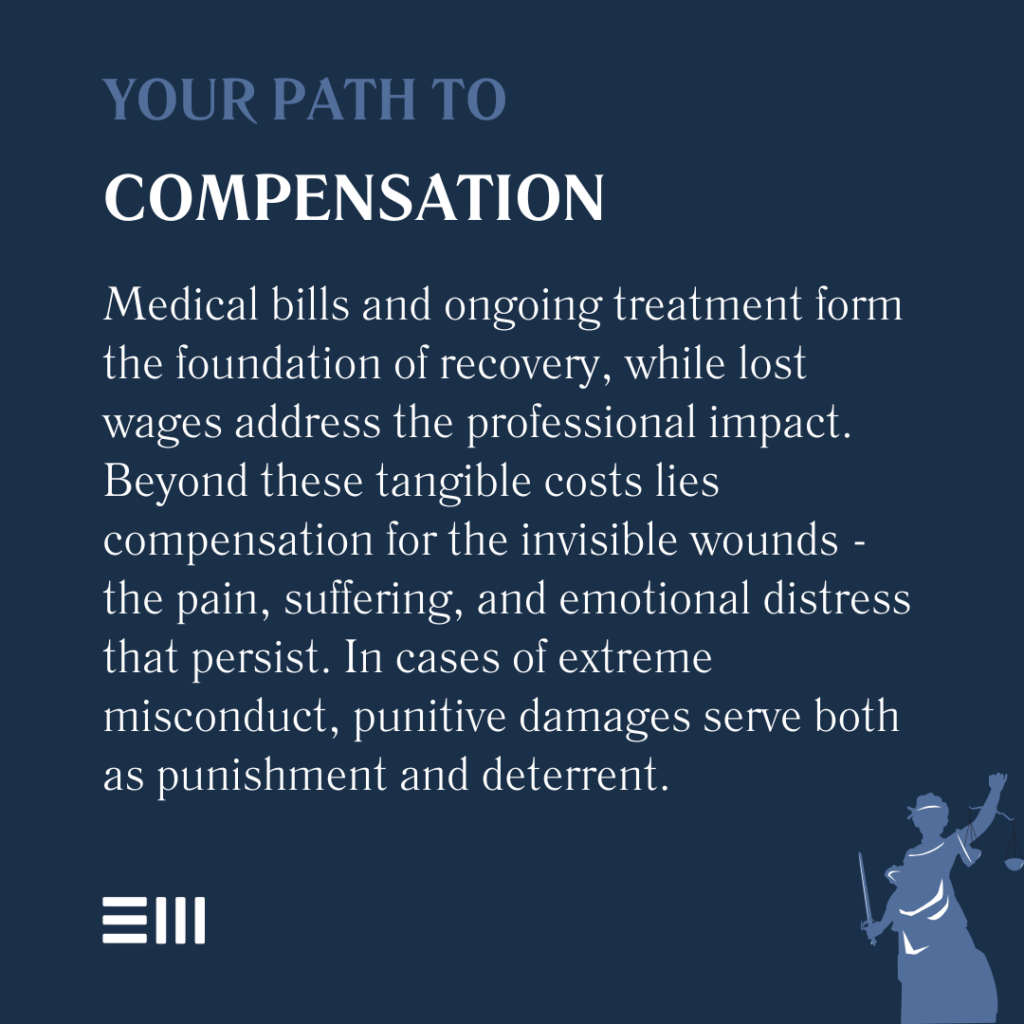
Behind closed doors and in public spaces across Alabama, survivors of assault and battery face life-altering physical and emotional trauma.
While the criminal justice system handles the punishment of offenders, civil courts offer a separate path toward justice and compensation for those affected by these intentional acts of harm.
Understanding Assault and Battery Claims
The path to justice through civil courts differs significantly from criminal proceedings, offering survivors additional options for holding perpetrators accountable.
Let’s explore how Alabama law addresses these intentional torts and protects victims’ rights.
Distinguishing Assault From Battery
In civil law, assault and battery represent distinct but related legal concepts.
Here’s how Alabama courts view these different acts:
- Assault occurs when someone creates a reasonable fear of immediate harm;
- Battery involves actual physical contact without consent;
- Threats may constitute assault even without physical contact;
- Harmful or offensive touching qualifies as battery;
- Both acts can occur separately or together; and
- Intent plays a crucial role in establishing liability.
These distinctions help courts determine appropriate compensation and legal remedies for survivors.
Common Scenarios in Civil Claims
Understanding typical situations helps victims recognize when they may have a valid civil claim.
Consider these frequent scenarios:
- Workplace confrontations and violence;
- Domestic violence incidents;
- Altercations at businesses or public places;
- School or campus-related incidents;
- Sports-related intentional injuries; and
- Security guard excessive force.
Recognizing these situations helps survivors understand their legal options for seeking justice.

Alabama Civil Law Framework
Alabama provides specific legal protections and remedies for assault and battery victims.
Consider these key legal elements:
- Two-year statute of limitations for filing claims;
- Burden of proof lower than criminal cases;
- Possibility of punitive damages;
- Consideration of comparative fault;
- Available protection orders; and
- Options for anonymous filing in sensitive cases.
These legal provisions create the foundation for pursuing civil justice in Alabama courts.
Types of Compensation Available
Civil courts recognize various forms of harm that survivors experience. Here are the types of damages potentially available:
- Medical expenses and ongoing treatment costs;
- Lost wages and future earning capacity;
- Pain and suffering compensation;
- Emotional distress damages;
- Property damage replacement; and
- Punitive damages in egregious cases.
Understanding available compensation helps survivors make informed decisions about pursuing claims.

Recovery and Rehabilitation Rights
The journey to recovery extends beyond the courtroom. Understanding your rights to comprehensive rehabilitation helps ensure full compensation.
Here are key aspects of recovery rights:
- Access to specialized medical treatment;
- Mental health counseling coverage;
- Physical therapy programs;
- Occupational rehabilitation services;
- Alternative therapy options; and
- Long-term care planning.
These recovery rights help survivors rebuild their lives while pursuing legal remedies.
Third-Party Liability Considerations
Many assault and battery cases involve liability beyond the direct perpetrator. Here’s how third-party liability applies in various situations:
- Property owners failing to provide adequate security;
- Employers neglecting background checks;
- Schools ignoring reported threats;
- Businesses with inadequate lighting or security;
- Security companies providing negligent service; and
- Organizations enabling dangerous conditions.
Understanding third-party liability expands options for compensation and accountability.
Frequently Asked Questions About Assault and Battery Cases in Alabama
Survivors of assault and battery in Alabama often have pressing questions about their legal rights and options.
Here, our Alabama assault and battery attorneys address common concerns about assault and battery civil claims:
How Long Do I Have to File a Civil Claim?
The timing of your claim can significantly impact your legal options.
Important timing considerations include:
- The standard two-year statute of limitations;
- Special provisions for minor victims;
- Discovery rule applications;
- Impact of criminal proceedings; and
- Extensions in special circumstances.
Understanding these timeframes helps protect your legal rights.
What Evidence Do I Need to Prove My Case?
Building a strong civil case requires various forms of evidence.
Key elements include:
- Medical records and photographs;
- Witness statements and testimony;
- Police reports and incident documentation;
- Security camera footage;
- Communication records; and
- Expert witness opinions.
Proper documentation strengthens your position in settlement negotiations and court proceedings.
How Does a Civil Case Differ From Criminal Prosecution?
The civil justice system offers distinct advantages for survivors:
- Lower burden of proof requirements;
- Control over legal proceedings;
- Direct compensation for damages;
- Additional accountability measures;
- Broader scope of responsibility; and
- Options for confidentiality.
These differences provide important options for seeking justice and healing.
Steps in Filing a Civil Claim
Pursuing a civil claim involves several important stages.
Here’s what to expect:
- Initial consultation with legal counsel;
- Evidence gathering and documentation;
- Filing of legal documents;
- Discovery process;
- Settlement negotiations; and
- Court proceedings if necessary.
Understanding these steps helps survivors prepare for the legal journey ahead.
Working With Legal Representation
Choosing the right legal representation makes a significant difference.
Look for these qualities:
- Experience with assault and battery cases;
- Understanding of trauma-informed approaches;
- Strong negotiation skills;
- Trial experience;
- Clear communication style; and
- Compassionate client support.
The right attorney serves as both advocate and guide through the legal process.
Role of Insurance in Civil Claims
Understanding insurance coverage plays a vital role in assault and battery cases.
Let’s examine how different types of insurance might apply:
- Homeowner’s insurance for incidents on private property;
- Business liability coverage for commercial locations;
- Employment liability policies for workplace incidents;
- Special event coverage for organized gatherings;
- Umbrella policies for additional protection; and
- Professional liability for security companies.
These insurance considerations help determine available sources of compensation for survivors.
Impact of Venue and Location
The location where an assault or battery occurs significantly affects legal proceedings.
Consider these important venue-related factors:
- Property owner responsibilities;
- Security requirements by location type;
- Public versus private property distinctions;
- Multiple party liability possibilities;
- Jurisdictional considerations; and
- Applicable safety regulations.
Understanding venue impact helps shape legal strategy and identify responsible parties.
Special Considerations for Vulnerable Populations
Certain groups face unique challenges in assault and battery cases.
Here’s how Alabama law provides additional protections:
- Enhanced penalties for crimes against elderly;
- Special provisions for disabled individuals;
- Extended filing deadlines for minors;
- Additional remedies for domestic violence survivors;
- Workplace protections for employees; and
- School safety requirements for students.
These special provisions ensure proper protection for vulnerable individuals.
Documentation and Evidence Preservation
Proper documentation strengthens your legal position.
Consider these essential record-keeping practices:
- Detailed incident descriptions and timeline;
- Photographs of visible injuries;
- Medical treatment records and bills;
- Mental health counseling documentation;
- Income loss verification; and
- Correspondence with involved parties.
Maintaining thorough records supports your claim throughout the legal process.
Start Your Journey to Justice
You don’t have to face the aftermath of assault and battery alone. Our experienced team understands the sensitivity of your situation and stands ready to protect your rights.
Can't find what you're looking for? Search our site below.










